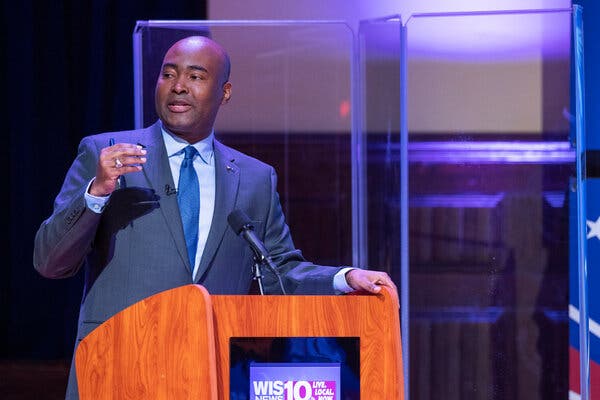Advertisement
Only a handful of states and territories will try to pick the Democratic nominee with similar practices as Iowa, where officials faced delays and problems reporting results.
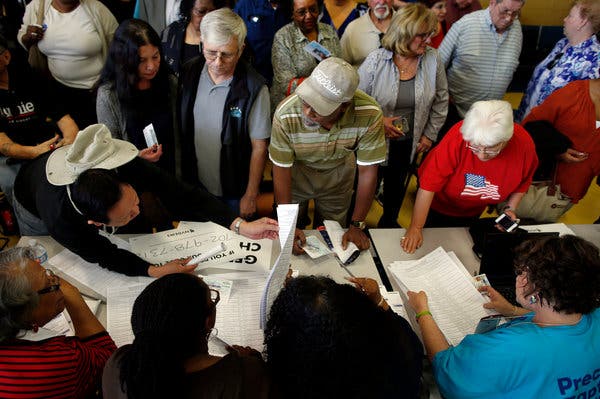
As Iowa grapples with the aftermath of a Democratic caucus that one party leader called a “systemwide disaster,” American voters and election officials are already looking ahead at the handful of other states and American territories that will be picking — or trying to pick — the Democratic nominee in similar ways.
The number of states that hold caucuses has been dwindling for years, in part at the encouragement of the Democratic National Committee to use a government-run primary. Kansas, Maine and Hawaii are among the latest states to opt for a primary system, which often allows more people to participate than caucuses.
In Iowa and elsewhere, caucuses have been criticized for typically taking place only for a few hours of the day and in venues away from a voter’s usual precinct. There were more than 1,600 precincts in Iowa on Monday, at schools, libraries, gymnasiums and other venues. There, Democrats gathered in groups to declare their support for one candidate or another — and to compete for undecided voters.
But, because state parties decide the rules of each system, not all caucuses work like Iowa’s. Some of the states that have kept their caucuses have made major changes to try to make them more inclusive.
On Feb. 22, Nevada Democrats will hold their caucus, capping off four days of early voting that will start on Feb. 15.
Democrats in Iowa have been criticized for holding the caucuses at night, a time that makes it harder for parents or people who work in the evenings to participate. They responded by setting up satellite caucuses.
In Nevada, the Democratic Party has added caucus sites to the back of casinos so casino employees working that day can participate. Republicans canceled their caucus in Nevada this year.
Democrats in the state are also providing caucus materials in Tagalog, in addition to English and Spanish, and are allowing people to vote early instead of having to participate in person.
But there is concern that Nevada, which has 48 delegates, could face some of the same problems Iowa faced Monday night, specifically trouble with an app that was supposed to tally and report results.
Democrats in Iowa used an app built by Shadow Inc., a for-profit technology company that was also used by the party in Nevada. On Tuesday, the state party chairman William McCurdy II said it would not use the app or vendor.
Nevada Democrats, he said, “can confidently say that what happened in the Iowa caucus last night will not happen in Nevada.”
American Samoa, a United States territory since 1900, has 11 delegates and will hold its caucus on March 3, which is Super Tuesday — when more than a dozen states vote in primaries.
A cluster of small islands that sit between Hawaii and New Zealand, American Samoa does not participate in the general election. In 2016, Democrats there picked Hillary Clinton, the eventual party nominee.
Republicans on the islands, who picked Donald Trump in 2016, will hold their caucus on March 24.
The state Democratic Party on March 10 will hold a traditional “firehouse” style of caucus, where voting takes place in an open area rather than in a closed polling booth.
But the party will also offer voters the chance to cast their ballots by mail as long as they are postmarked by March 3. The party picked Senator Bernie Sanders in 2016.
Mr. Trump will be the only presidential candidate on the ballot for Republicans during the party’s caucus on March 10.
The state Republican Party chairman, Rick Berg, told The Bismarck Tribune he expects the caucus to be “an evening of getting together with Republicans across the state.”
Democrats will hold their caucus in Wyoming on April 4, when, for the first time, voters will be able to rank their choices.
Voters will be allowed to rank up to five candidates instead of having to choose only one.
It is a system being piloted in Alaska, Hawaii and Kansas, and was first tried in Maine in 2018.
Like Nevada Democrats, registered voters do not have to show up to caucus sites to be counted. They can drop off their completed ballot or fill it out on March 28. A total of 18 delegates are up for grabs in the primary.
Nina Sanchez Hebert, a spokeswoman for the Wyoming Democratic Party, said each caucus location would have a secure computer and Wi-Fi connection to transmit encrypted files, like ballots.
Paper ballots would be “securely retained” by county officials in case a hand count became necessary, she said. And officials would not employ the app created by Shadow Inc. to tally or report results.
“We are not using the same, or any, app to tabulate or transmit results,” Ms. Hebert said.
The majority of caucus voters picked Mr. Sanders as the Democratic nominee in 2016 and Mr. Trump as the Republican nominee. Republicans will pick their nominee by holding conventions.
Guam, an American territory in the Pacific Ocean about 128 miles south of the Northern Mariana Islands, will hold its Democratic caucus on May 2.
Democrats in the territory, which has 12 delegates, picked Mrs. Clinton in 2016. Guam also cannot participate in the general election.
Democrats in this United States territory will hold their caucus on June 6. The territory has a total of 13 delegates and picked Mrs. Clinton in 2016.
American citizens living on the Virgin Islands cannot vote in the general election.
transcript
0:00/9:11
-9:11
transcript
Why the Iowa Caucuses Are So Important
Protests in the 1960s, a mimeograph machine and a long-shot candidate all contributed to Iowa’s unlikely role in the presidential election process.
-
This was Iowa caucus night back in the mid-1970s. And these are members of the national media covering the voting. It was so unusual to see national media in Iowa back then that people actually paid to watch them. “The Democratic Party charged $15 a head for people to watch the media watch the people.” See, in previous years, Iowa’s caucuses just hadn’t attracted national attention. “There are 3,000 frozen media members in downtown Des Moines …” Just over a decade later, Iowa is the place to be. “… It’s Iowa caucus night. Let’s party.” [shouting] The caucuses are now a key part of the presidential election cycle. “Bush, 57.” They’re the first chance to see what kind of support candidates have among voters. So how did we get here, from caucuses that only Iowans seem to care about to the national spectacle we see today? Turns out, a lot of it was accidental. For most of Iowa’s history, its caucuses were dominated by political insiders. There was little room for input from rank-and-file members. An historian writing in the 1940s put it like this: “The larger number of party voters were deprived of a voice.” But the old ways start coming to an end in 1968. The country’s in turmoil, and so is the Democratic Party, mostly over the Vietnam War and civil rights. Basically, the party establishment wants to handle things one way, and many rank-and-file members have other ideas. All this comes to a head as the Democrats hold their national convention. Protesters gather outside. So do police. Inside, the mood is also tense. All this division leads the Democratic Party to rethink the nomination rules to include the voices of all party members in the process. This is how we come to the moment when Iowa becomes key to electing a president, basically by accident. First up, how Iowa became first to hold a presidential contest. It starts with new rules to give everyday members more of a say. So by 1972, winning Iowa now involves four stages. Iowans choose their top candidates, first at the precinct level. These are the caucuses at the heart of this story. But technically, there’s further voting at the county, congressional district and state levels. The new rules make things a lot more inclusive, but this creates new delays. Committees need to be formed, and everyone needs to have up-to-date party materials. The problem is, the state party only has an old mimeograph machine to make copies of all this. It’s really slow. So because of an old machine and a bunch of new logistics, the party decides it needs at least a month between each step to do it all. The national convention is set for early July, so you’d think that the state-level convention would happen about a month before, in June. Except, the party can’t find a venue that’s available to hold everyone. That little detail helps push everything earlier in a chain reaction. See what’s going on here? The precinct caucuses now have to happen early in the year. The party chooses a date that makes Iowa’s the first presidential contest. The New Hampshire primary has been the first kickoff contest since the 1950s, but Iowa Democrats aren’t necessarily looking for national attention. They just think it’ll be fun to be first. Still, attention is what they get. The story begins with George McGovern. “People didn’t know much about the Iowa caucuses. As a matter of fact, there wasn’t a great deal of interest in them.” He’s the long-shot candidate. He’s been at the bottom of national polls. “He often walked the campaign trail alone, little known by the voters.” Most people think this guy, Edmund Muskie, is going to be the big winner in Iowa. “That challenge is great, but we can meet it.” Then comes caucus night. As the people vote, state party officials gather at their headquarters. Richard Bender is one of them. “And we had about 10 or 12 press people show up. These press people included one guy, Johnny Apple.” Johnny Apple, a 37-year-old political correspondent for The New York Times. Iowa’s Democrats aren’t ready to publicize the results right away. They hadn’t expected much demand. According to Bender, only Johnny Apple asked for them that night. “I happen to be fascinated with such things, so I made it my business, beforehand, to understand it.” Bender sets up a phone tree to gather results from across the state. He adds them up himself with a calculator. And the next day, Apple’s article helps swing the national spotlight onto the caucuses. He’s got quite the story to tell. Muskie’s won, but just barely. Not the runaway win people were expecting. And McGovern comes in a strong second. No one expected that, either. The reformed caucus rules helped a long-shot candidate rise to the top. And because this is happening so early in the election now, and because Apple’s article gives the results national coverage, something else happens. “That got picked up by some of the national news shows.” “The Democratic front-runner has been damaged in Iowa.” “And wow, all of a sudden, we were being paid attention to.” McGovern eventually wins the Democratic nomination. “I accept your nomination with a full and grateful heart.” He loses the presidential election, but some haven’t forgotten what those early caucuses did for McGovern, including Georgia’s former governor, Jimmy Carter. Three years later … “There was a major headline on the editorial page of the Atlanta Constitution that said, ‘Jimmy Carter’s running for what?’ [laughter] And the ‘What’ was about this big. [applause] I’m running for president.” … Carter heads to Iowa before any other Democratic candidate. He’s got no national profile. “He didn’t have hordes of press following him around. It was a very lonely campaign.” Washington pundits call his candidacy laughable. “I remember when we couldn’t find a microphone.” “Jimmy Who?” becomes a catchphrase. Carter’s own campaign film plays it up. “Jimmy who?” “I don’t know who he is.” But as long as Iowans come to know him and like him, Carter bets that the media will start paying attention, just like with McGovern four years earlier. Carter campaigns as locally as possible. One day, he learns that he’s been invited on a local TV show. “And I said, that is great. I can’t believe it. I said, ‘What are we going to do?’ He said, ‘Do you have any favorite recipes?’ And I said, ‘What do you mean, recipes?’ He said, ‘Well, this is a cooking show.’ Well, they put a white apron on me and a chef’s hat. That was my only access to TV when I first began to campaign in Iowa.” His opponents are in Iowa, too, but they spend far less time there. Carter wins. “Surprisingly top of the class after his win in a somewhat obscure race in Iowa against the others.” “You can’t tell until we go to the other 49 states, but it’s encouraging for us.” A year later … “I, Jimmy Carter, do solemnly swear —” … he becomes the 39th president. Now we need to head to 1980 because we haven’t talked about the Republicans yet. Here’s the state’s Republican chairman that year. He’s asked why Iowa’s caucuses have become so important. “I think because Jimmy Carter got his start in Iowa in 1976.” The Republicans in Iowa are keen to copy the Democrat’s success, and one candidate in particular gets inspired by Carter’s underdog win: George H.W. Bush. He’s running against Ronald Reagan, Bob Dole and others, and he’s near the bottom of the pack. “Your name isn’t really a household word, but Ronald Reagan can —” But Bush goes big in Iowa. He gets a surprise win. It’s a far cry from just months before. “I was an asterisk in those days. And my feelings got hurt. And now, I’m no longer an asterisk.” Bush is now the third underdog to get a boost from the caucuses. The next morning on CBS, he distills the essence of this new Iowa effect. “We will have forward, ‘Big Mo’ on our side, as they say in athletics.” “ ‘Big Mo?’ ” “Yeah. Mo — momentum.” Bush loses to Reagan, but becomes vice president. And the desire to capture the “Big Mo” from Iowa has only grown, thanks in large part to Iowa’s embrace of being first, and the media storm that descends every four years. That’s despite the fact that most candidates who win … “This is a job interview.” … don’t become president. Plus, many point out that the state’s overwhelmingly white population doesn’t reflect the country’s diversity. “I actually think that we can find places that represent that balance of urban and rural better.” But the race to get the “Big Mo” out of Iowa persists because it’s the first chance to upend expectations, and put political fates in the voters’ hands.
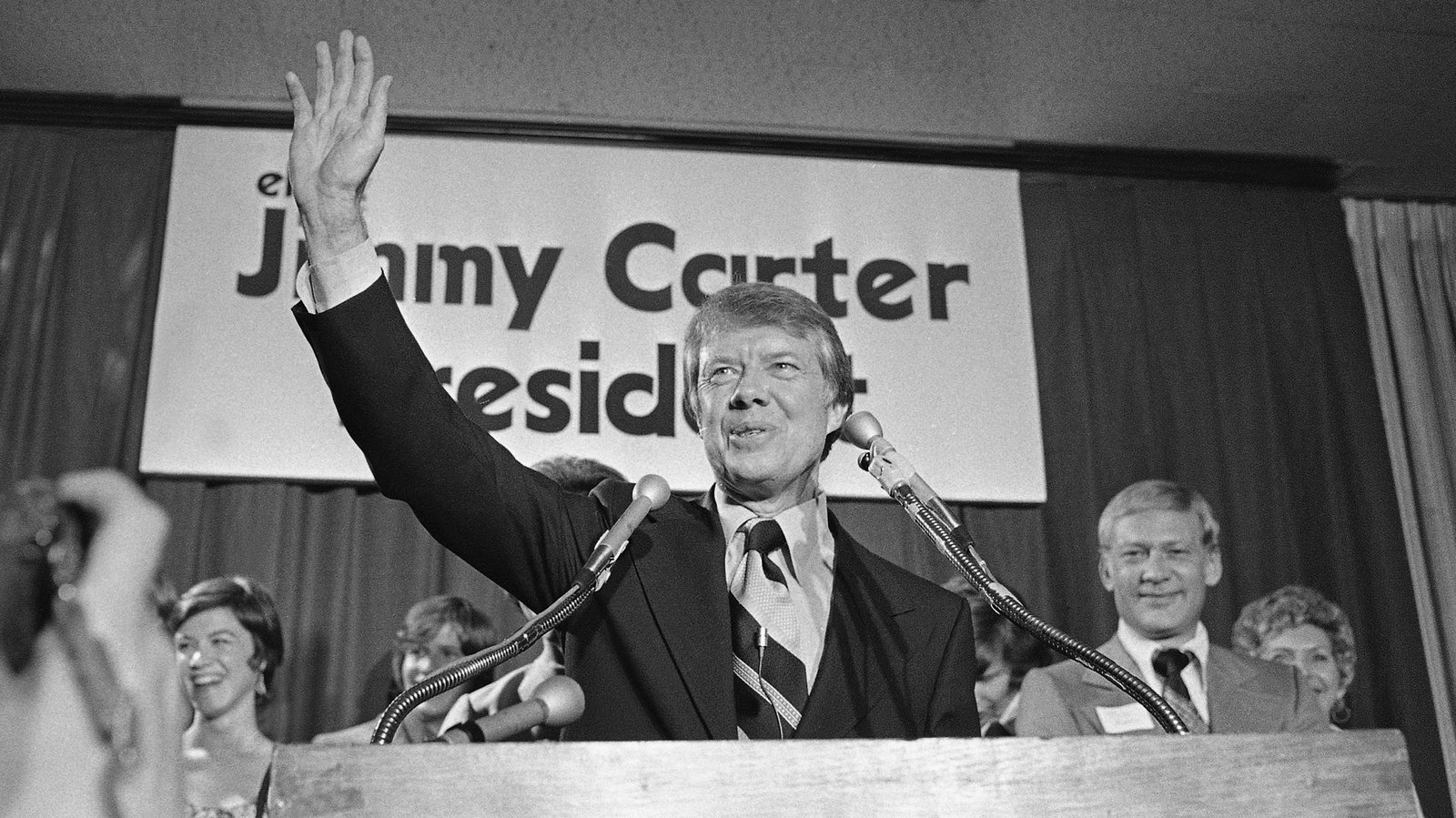
-
-
- Tuesday is the most important day on the primary calendar, with about a third of the available delegates up for grabs. Here’s what you need to know.
-
- Bernie Sanders is leading the delegate race after the first three contests. Keep track of the latest count and the upcoming primary calendar.
-
- Learn more about the Democratic presidential contenders.
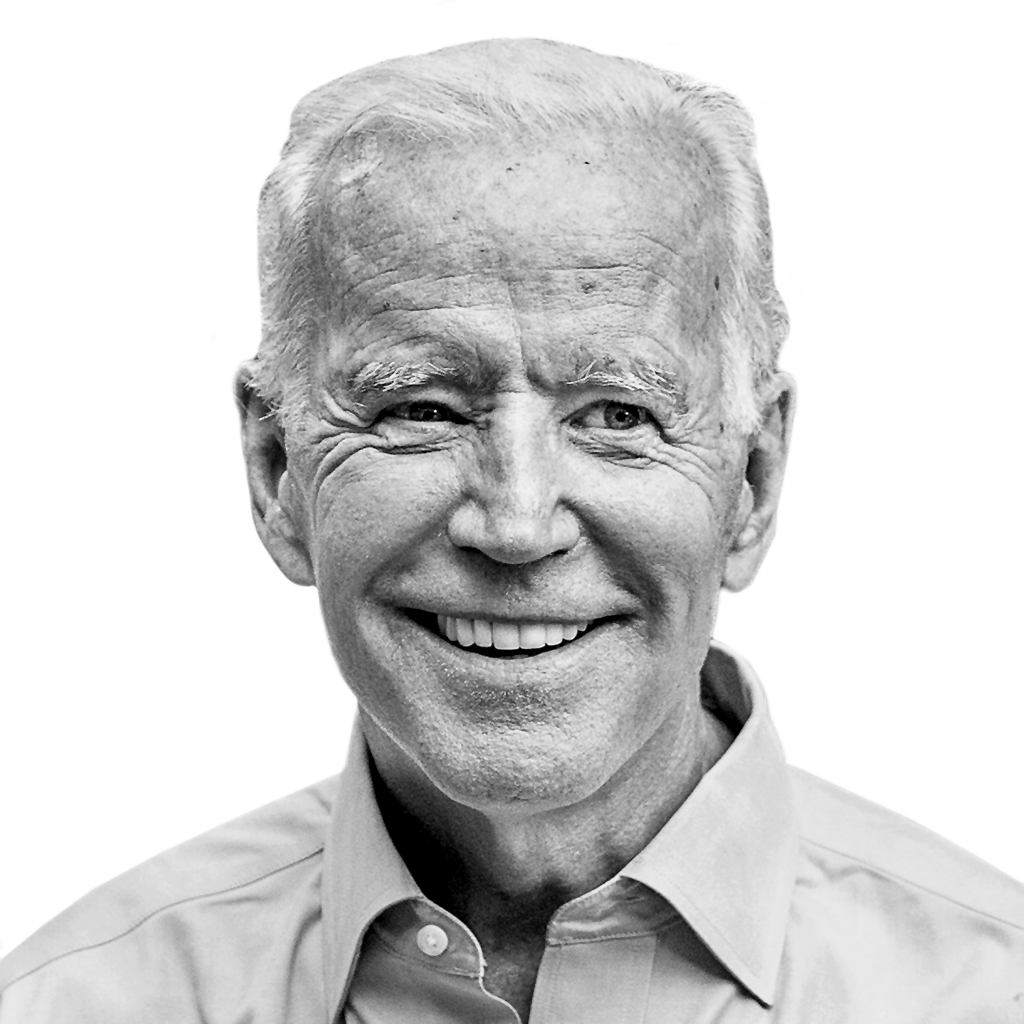
Joe Biden
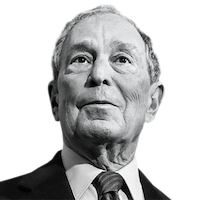
Michael Bloomberg

Pete Buttigieg

Tulsi Gabbard

Amy Klobuchar
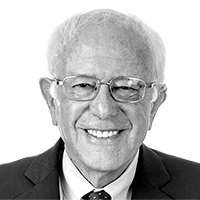
Bernie Sanders

Tom Steyer
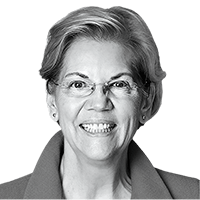
Elizabeth Warren
-
